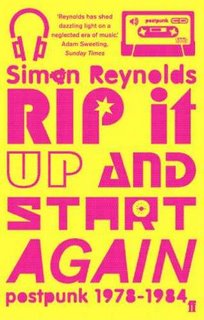Mighty Kim has a heart after all. Do you reckon she actually geniunely loves him? Or could it be something to do with his elevated position? Then again, if you're a North Korean female and Kim Jong-il offers his hand in marriage, I suppose you're not really going to say no...the funniest bit though is when it mentions that Pyongyang has a "University of Music and Dance". It's fair to say that Acid Mothers Temple won't be making a trip across the Sea of Japan any time soon to do a gig there...
Wednesday, September 27, 2006
Went to Brick Lane today and checked out the market for a bit before tracking back to Mare Street to investigate a 'happening' at Las Vegas Tattoo's. There was various art exhibitions and interesting characters providing fake tatoos (I had one). You could, of course, have a real tattoo if you so wanted to...I'd love to think it would make me look hard, but I'd probably just end up looking like a Shoreditch twat.
Anyway, there's no getting away from it - is Brick Lane going to become the new Notting Hill? I can't really say I'm too happy about the new Monica Ali film shot on location, but not because it'll make the area touristy - as if it's not already anyway. Nor am I one of those stuck up twats - most of them originally from the posh part of the Home Counties* - bemoaning camera-weilding tourists from Germany, France or Brazil or wherever, as if these twats have some precious right to Brick Lane that's being eroded by those inconsiderate types abroad (a typical example was some posh bint working on one of the stores, who stuck her nose up to everyone).
No, I'm just annoyed because it means that prices will go up and up after the film and anyone on a relatively low income, or anyone with an 'artistic' lifestyle who isn't bringing tons of money, will be priced out of the area. It'll become like vast swathes of West London, in other words, but just as with there you will still have the council estates with the dire poverty. So the polirisation between the rich and the poor will become exacerbated, just as with Rotting Hill...although I live in Bethnal Green near the end where it meets Cambridge Heath Road rather than Brick Lane, or further to Shoreditch High Street, I can imagine this trend spreading....
* highly unscientific random guess
So no more Top Of The Pops, eh? It has finally been axed. I haven't watched it in years, of course, like most people I imagine, but still....TOTP is embedded in the memories of most music fans from when they were growing up eagerly waiting for that 7 o'clock show, and it certainly brings back memories for me. Only the most die-hard cynic would say that in it's golden period it wasn't an important milestone in exposing music on mainstream TV. All we've got left now on terrestial TV is fucking Jools Holland and his mate KT Tunstall. Respect to The Fall for making him sign a contract stating that he couldn't play boogie-woogie piano along with them.


Berlin is a pretty amazing place. The city seems to be continually in a state of flux, with endless building sites redoing whole areas from scratch. There's a kind of weird Blade Runner feel to the area when you get the overground, with huge highway-like streets dazzlingly laid out in front of you when the train is on a raised track. Initially the Docklands Light Railway came to mind, but this is a more dystopian feeling landscape, with endless abandoned warehouses and no-mans land places...it has the feel of London back in '92, or even what the back of King's Cross is now if it was squatted more, with endless nooks and crannies uncovering films showing in some of the abandoned buildings and all kinds of impromtu arts stuff going on in these huge squatted warehouses...sometimes I felt like I understood why Einsturzende Neubauten made the kind of music they did, though maybe that's just me sounding like a nerdy tourist / middle-class Wire-reading type into German industrial music. It's an incredibly urban, industrial city in a way that lots of other cities aren't. We went to a club in the Arches with this incredible skyscraper skyline in front of us, yet at the same time industrial wreckage was sprawled all around. It's like parts of the city have gone distinctly wrong since way back when the city was bombed incessantly, and the only way to correct the problem is to raise the areas to the ground completely before starting rebuilding again. In that respect, I can understand why a lot of the Techno bods operating in the city made a comment a while back in a Wire feature that they saw Detroit as their spiritual 'sister' city. Both are hard, grimy but also intensely futuristic cities that produced an appropriately uncompromising, dystopian Techno soundtrack. Whole squatters and traveller types lived in caravans around the river, and you could hear the distant sounds of interesting things going on...on the train, you could see tantalising glimpses of the parties they were having. After that, London seems pretty tame in comparison.
Recent listening
Movietone - Day And Night
Sigur Ros - Takk...
Hood - Cold House
Jackie-O-Motherfucker - Flags of the Sacred Harp
Dead Meadow - Shivering King and Others
Fennesz - Endless Summer
We are all doomed.
Could Britain become like this??
What a depressing thing to reveal in an interview. So will all his actions from now on be attributed because his personal friend up in the sky told him to do so? Sometimes I think the difference between Blair and Bush is not as different as it seems....obviously that's not really true in the sense that Blair at least acknowledges in the link above that this can go too far. At least he's not a born again Christian....is he?
Nonetheless...why do people constantly feel the need to have God sanctify what they do? There's something like 140 billion galaxies in the Universe, of which we are part of just one, stuck on a spiral arm that's the equivalent of the Scunthorpe of our solar system. Even if there is a God, I'm sure that he doesn't give a toss what we do or don't do. Yet people seem to think they have their own personal God who cares about their everyday life, who cares if they pray 3 times a day rather than 5, whose watching their every move and honestly has a geniune interest in people's affairs.
If you had to look after 140 billion galaxies, wouldn't you be a little too busy to deal with that shit?
Exactly.
That's quite a controversial thing to say, given Blair's blessing of religious schools posing as normal comprehensives. Why do so many people equate aetheism with an incompatability to appreciate the world around you, an inability to enjoy nature? If I told a devout person that I had just seen pigs fly, or that I had levitated off the ground for hours on end, they would demand as much evidence as the next person.
Yet with religion, we are told to believe completely ridiculous myths without question.
Well thanks, Tony. I feel much more secure now that God has given the thumbs up for the invasion. Do you think if I'm nice to him he'll get me a widescreen TV for my birthday?
There's something in this depressing article about the polarisation of India's classes (particularly in the bits about the new gated-off settlements for the rich) that reminds me of what Baudrillard said about LA, with it's gated enclaves, CCTV panoptican power, and bordered off communities that never speak to each other...it kind of makes me think, could London end up that way too? I mean, London seems a more mixed city in the vein of NYC, but when I was living in Tottenham I couldn't help but notice how quickly the mileu changes when you drive in the car from Tottenham to Hampstead Heath, for example....the contrasts are startling.
a theory has been postulated in a recent issue of New Scientist in which some dudes postulate that what we think of as the Universe is in fact one giant five dimensional black hole.
Admittedly this is pretty difficult as most people (me included) immediately would think of the classic 4-D version of a black hole, in which the enormous tidal forces would instantly pull anything - whether the planet Earth if it fell into a 4-D black hole, or light, or a spaceman adrift - apart. Anyone who'se read Stephen Hawkins would be familiar with his notion that time, light and space would become distorted, and with the example of a spaceman in a ship orbiting a star collapsing into a black hole, where the signal from his mate - whose on the star falling into the black hole - taking longer and longer to reach the guy in the spaceship until it becomes infinate. Thus time is stretched, which has led to exotic theories about black holes leading to gateways into other galaxies, etc.
Anyway, if this new theory is true, it would surely challenge the prevailing theory of black holes, as if it's true then our very existence shows that it's possible to live within a 5-d black hole. Of course, this doesn't take into account that there may be 4-d black holes within a 5-d one - and in fact, it's believed that in the centre of our galaxy (of which we are a tiny part of one spiral arm) there's a black hole. The idea of 4-d black holes within 5-d ones is pretty mental.
It could mean that what we think of as the Universe as a whole may be just one 5-d black hole existing within an unimaginably vaster Universe - one with alternative realities. Hopefully these alternative realities don't contain this pitiful lot.
The guy at K-Punk has done a reply of sorts to Simon Reynold's article....I agree about that awful Guardian article (which it links to) - and me saying so doesn't mean I'm an old out-of-touch fogy. Just because British guitar music is booming, it doesn't mean that the Kaiser Chiefs or The Zutons or the Dead 60's or whatever else of this kind of ilk that the NME is hyping up are any good. Then again, that doesn't mean that all guitar 'indie' (whatever that means these days) music's worth is negated, just that chancers like The Rakes are not the future of music.
Excellent contribution to the Danish cartoon debate too at the bottom of the screen, which puts the controversy into perspective.
As we progressed to the 00's, his attention turned to much garage and the 'grime' scene, though naturally he still covers much of the more experimental fringe of alt-rock.
Given his commitment to futurism in music, his post on the Artic Monkeys seems pretty interesting. I always assumed he'd dislike them for being the very personification of the square four-piece indie outfit, but apparently not....could it be that he no longer believes that music has to be forward thinking to be valid? At one point he even says that much dance music has become just as retrograde as indie music - a startling admission by SR's standards.
Recent listening
Liars - Drums Not Dead
Caribou - The Milk of Human Kindness
Broadcast - Tender Buttons
Stereolab - Instant O In the Universe
Amon Duull II - Yeti
Cul de Sac - Immortality Lessons
Dirty 3 - Ocean Songs
Herman Dune - Not on Top
Six Organs of Admittance - School of the Flower
Looking at Ticketweb/Stargreen's listings today, I couldn't help but notice the depressing way in which many big venues around the country now are prefixed by the name of a beer, or (in the case of those 'NME nights') sponsored by 'Shockwaves' - a hair gel? Dental floss? Whatever, it's just one more in an endless corporate rebranding of venues so that, for example, the Brixon Academy is now the 'Carling Brixon Academy'. This isn't Disgusted from Tunbridge Wells complaining because of a fear that it's only encouraging people to drink more. On the contrary, one of the most depressing things at these places is that I've frequently been told that there's not enough alcohol - or rather that there's not enough different brands of alcohol, as naturally only one brand is available - that of the sponsor. This was made apparent to me during Sun O))))'s gig at Islington Academy (sorry, 'Carling Islington Academy'), where virtually the only drink you can buy is....you guessed it. And only in a can, not on tap, if I remember rightly? So you can't even choose which beer you like to drink at a gig that you've forked out £15 or more for these days.
Sure, music is a business like any other, but it's still depressing when you go to some of these venues and see how uniform and corporatized they can be. Reading Festival, natch, is the same.....so yeah, thumps up for those labours of love that are 'going it alone', ie the independent likes of the Luminaire and the Spitz, or the Scala and Bush Hall, or the Buffalo Bar....maybe there's sponsorship lurking somewhere in these places (I can't say for sure, but I doubt it), but it's not thrusted in yr face; if it is, at least it remains secondary to the venue and the music. They're not sucking on a giant beer corporation to keep them going.
And at least at these places I can drink something that isn't bloody Carling.
Tuesday, September 26, 2006


Its kind of fitting that anomie should be a French word. According to this article by openDemocracy, thats exactly what the French youth were feeling when protesting against De Villepins CPE contract, which would have made it possible to fire a worker on the spot between the ages of 20-26 with no explanation. Much has been made of the fact that while the sioxante-huitards of 68 (depicted recently in Bertollucis film The Dreamers) took to the streets in idealized hopes of change, with a desire to be different than their parents generation, yet against a relatively prosperous backdrop, the current protestors have took to the streets in order to stop change, and against a backdrop where Frances unemployment has risen to the worst for years. The protests have taken place out of fear for a less than secure future, and consequently have had a different, dulled hue to their parents idealism. Whats remained less commented on is that Chirac and De Vellepin may have backed down because of the knowledge that if the law had been put permanently in place, there could have been a huge exodus of young French graduates to elsewhere in the world one that could even have been dehabilitating to the French economy. After all, if serious about a career in a certain field, why would you do it with the knowledge that you can be sacked at any time within the next two years in a job related to that field, for no reason at all, whereas in other countries you cant? Despite the fact that the left-wing French intelligentsia has often painted the Anglo-Saxon economy as the ruthless bogeyman, there are actually rights that protect workers in their first two years in a full-time, permanent job here in the UK.In any case, the knives have come out in articles such as this one from the Economist, who claim that France is struggling in a globalized market. Yet its too easy to slate France for its economic protectionism. You have to hand it to a country that has managed to have the sixth biggest economy in the world (that is if you include China in third place these days above Germany and the UK no prizes for guessing the two above China), yet which has managed to protect the 35-hour working week. As the recent takeover of The Body Shop by LOreal has showed, Frances companies are competing well on the world stage far more than the English-speaking press might acknowledge.Nonetheless, while the protestors may hail their victory particularly as de Vellepin lurches from one crisis to the next - the article suggests that there may be a deeper underlying anomie effecting France, one that can be encapsulated to some extent in Michel Houllebecqs writings, and its certainly true that his books capture the alienation of the French individual as the country goes through one of its periodic existential thoughtful moods. His books capture a France that still remains a huge power in the world, yet which is fighting a losing battle to the English language and American culture (and, increasingly, perhaps Cantonese/Mandarin and Spanish). While a lot of the cynicism and anomie expressed by his characters may seem quintessentially French, whats interesting is that a lot of it seems to me pretty blatantly ripped off from some of Brett Eastons Elliss works, particularly in the bored, flat descriptions of the more graphic elements to both novelists works - read the emotionally flat, almost uninterested descriptions of group sex and graphic murder next to similar scenes described in cold, neutral style in American Psycho and youll see what I mean. This technique used by both writers is deliberate, of course, the natural consequence of essentially jaded viewpoints of Western humanity from cynical middle-class, middle aged men and it should be pointed out here that Houllebecq is no great admirer of France either, judging from the comments in his books. From the Western sex tourist in Thailand in Platform to the pathetic sex-obsessed loser Bruno in Atomised contrasted with his cerebral, reserved half brother Michel, a molecular biologist his characters arent exactly shining heroes.The success of Houllebecq in the Anglo-Saxon world suggests that his depiction of modern Western man in a state of despair is not limited to France after all. His work resonates in Hollywood films like Fight Club, in which Brad Pitt and Edward Norton attempt to wage an anarcho-war against credit card culture. It could be that the anomie felt by France at the moment is one that could spread to much of the rest of Western Europe as it faces a new century in which the dominant emerging economies will be the China and India despite the assertion by Mark Leonard that Europe will run the 21st century.

Was thinking about Simon Reynold's account of post punk, Rip It Up And Start Again - although the majority of the book is based on the U.K. scene, there's a fascinating chapter on the downtown New York No Wave scene that coalesced in the late 70's and early 80's. No Wave was an interesting scene, and especially with bands such as Mars and early Lydia Lunch's stuff with the Teenage Jerks, as it represented such a break with anything from before. The section on Mars recounted how they used to visit loads of record shops and plunder the world music archives and 'ecstastic voodo music' - something that might sit strange at first when listening to their atonal workouts. However, you can hear the influence on closer listen, with the song titles ('Outside Africa') and the strange quasi-tribal drum beats, alongside the metallic racket. This (perhaps ephemeral and patronizing, but still...) world music obsession was seized on by Talking Heads, of course. Amazing band - Mars, I mean, not Talking Heads. Well, some of TH's stuff is good too.
I'd wager that nowadays the closest relative to Mars is something like Gang Gang Dance - the spiralling tribal polyrhythms and uncoventional marriage of no-wave noise with dub rhythms and unconventional microtonal vocals on 'Revival of the Shittest' has more in common with Mars than any of the scratchy post-punk bands with their 'angular' guitar riffs around at the moment.
The chapter focuses not only on the music - Mars, DNA, Lunch, James Chance, Glenn Branca (albeit only briefly, sadly), etc. - but also on the socio-economic context of a city entering the 80's Reagen era, which when taken to the extreme would eventually be reflected in the likes of 'Wall Street' (you know, the Michael Douglas one) and 'American Psycho' as the decade went on.
It struck me that this late 70's/early 80's period - where the dividing line between the NY downtown art-rock scene on the one hand and the city's jazz and disco scenes on the other - became blurred and in a state of flux in a way that the present day London music scene owes a huge debt to. Nowadays it's common to have disparate musical strands on the same line-up, but it wasn't always thus...
Monday, September 25, 2006


The man above is Saparmurat Niyazov, the 'President of Life' of Turkmenistan in Central Asia, a country where his narcisstic tendencies have oustripped even North Korea's Kim Jong-il. In this former Russian republic, which became independent in 1991, the days of the week are named after himself (exactly how I'm not sure, unless he's got quite a few middle names), all watches and clocks have his portrait, and - in an echo of Mao's 'Little Red Book' - he has an official book called 'Ruhnama' which will make people "become more intelligent" and facilitate a trip "straight to heaven" if read three times. George Orwell would have a field day, except for the bit about becoming more intelligent, as I seem to remember one of the Big Brother slogans in 1984 being about remaining stupid ('Ignorance is Bliss').
Most amusing of all, an enormous statue of himself continually revolves on a rotating pedestal in the capital Ashgabat, so that it always faces the sun (even if there's a total eclipse, I suppose).
That's pretty funny, in a depressing way. Jesus, imagine naming the days of the week after Tony Blair. Whenever I'm feeling down, I just think of the poor buggers - all five million of them - who have to grow up in this place...or in North Korea, of course, where their dear leader is so bonkers that he actually once had a terrified Chinese film maker kidnapped in order to make a propaganda film which had Godzilla but with Kim Jong-il's face. They showed clips from it once on Channel 4 in a documentary about mental films, and there's one bit when this weird , enormous hybrid creature - Godzilla's body, Kim Jong-il's face - attacks Japan. Now I don't know about you, but if I were on drugs watching that, I'd be pretty freaked out....
